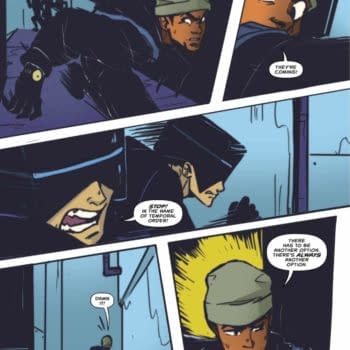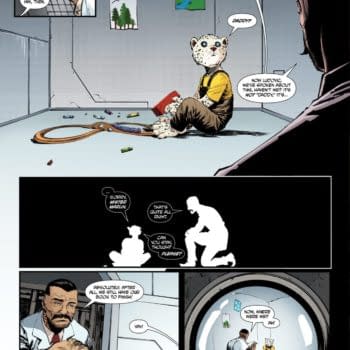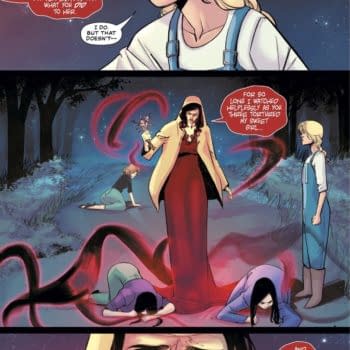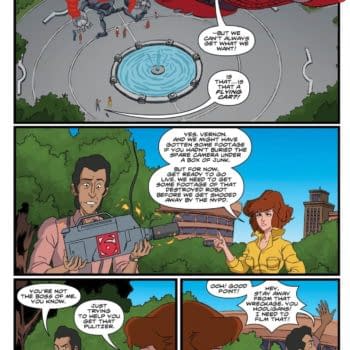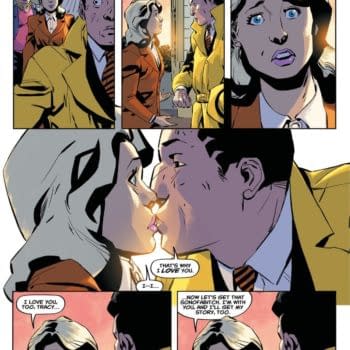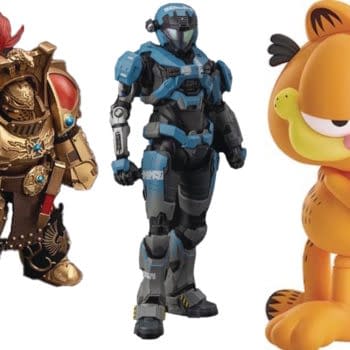Posted in: Comics, Recent Updates | Tagged: avatar press, Comics, crossed: badlands, entertainment, homo tortor, kieron gillen
It's A Crossed C-Day Fest! Kieron Gillen Talks Pre-History, Horror, And Megafauna
Today is C-Day for Avatar Press' series Crossed, and today Kieron Gillen's 75th issue of the series arrives with art by Rafa Ortiz, kicking off a new arc of Crossed: Badlands called Homo Tortor running for 6 issues.

Crossed C-Day 2015 is here! And to celebrate the event, superstar writer Kieron Gillen (Uber, Wicked & Divine) is launching a new story arc that will take the horrors of the Crossed back to the ancient past! 75,000 years ago was the closest humanity has ever came to being purged from the Earth. There were as few as 2000 humans remaining. This is historical fact. Why it came to this is generally blamed on super-volcano Toba causing a minor ice-age. But that's not the full story. That is not the history of the Homo Tortor, i.e. Man The Torturer.
This empire before the beginning of time, that sends raiding parties gathering other Homo species and enormous mega-fauna, invented cruelty, refined domination, perfected killing. And they think their power will last forever. Join the hunt for historical answers with this issue that kicks off C-Day events worldwide as fans celebrate the grueling world of Crossed at comic shops everywhere. There is no help, there is no hope. There is only the Crossed.
In keeping with the festivities, we are bringing you a fairly massive interview with Gillen on the Homo Tortor arc, giving insight into his inspiration, process, and what it means to take the Crossed concept into the distant past for the first time. There will be chilling comparisons between the past and present. There will be vantage points on the Crossed phenomenon from prehistory. There will be plenty of ravenous beasties. Brace yourselves for a discussion of what Gillen is calling, "the most extreme version of the genre existent".

Kieron Gillen: Garth Ennis is one of the writers who I was reading even before I considered myself a comic reader. I describe myself as a one-or-two trade a year guy before I fell down the hole. One of those one-or-two trades was Preacher. As such, my first impression of Crossed was very much, "This is a really interesting application of Ennis' skill-set and themes."
I mean, my other response was UGGGGHHHH! WHAT THE FUCK IS THAT GUY DOING TO THAT GUY!!?!??! but there's always a little over-intellectual wankery when I read things.
I actually have some essays I wrote about Crossed back in the day, in terms of talking about how it creates its effects. That first arc is a book that isn't actually quite as visually horrific as people tend to think. Garth and Jacen [Burrows] show what happens when Crossed catch up with humans once in detail, in that first issue. That image then haunts the rest of the book, and all other future deaths become it. It's really devastatingly effective craft.
What relation does it have with reality? Especially in its early days, it was explicitly attacking the survivalist post-apocalyptic fantasy of what you would have. It's telling that the first, most horrific death is the fucking idiot who bought into what stories have sold him. I also think it was the first time I saw anyone ever write someone not believing footage they've seen on the Internet, which is pretty impressive.
HMS: Crossed comics are incredibly violent and yet the underlying elements certainly attract creators once they start thinking about new angles and possibilities. What about the Crossed concept makes it such an open place for multiple creators to work, do you think?
KG: Let's state the obvious: it's a setting, not a set of characters. As such, you can do a story anywhere in the world, just dealing with this single existential threat. It's the most extreme version of the genre existent, so you can simply go as far as you think is required. In some ways, I actually think the flexibility is a little bit of a curse – what I think really makes Crossed is the Tone. You can completely write Crossed in various modes, but it really works best if you skew it very close to Garth's. It is very real, you eschew as many genre tropes as you can – you make the humans very human, which is what makes what happens to them so utterly horrible.

KG: Garth's work is the core canon. You read Garth's stuff first, and they're all highlights. My personal favourite outside that is actually Crossed: Wish You Were Here, which I think is an astounding piece of work by Si Spurrier and friends. Also free, so get your browser over there if you haven't read it yet.
HMS: I believe you're the first writer on Crossed to really take us into the past. How did that big departure first occur to you and what about exploring a possible past for the Crossed outbreak sparked your imagination?
KG: If you put aside Pop-Music, I suspect playing with history may be my most common trope. As such, it's a very me move to start thinking about. I actually had a completely different idea of a historical story, but basically due to the events of Thin Red Line, it didn't fit in the way Crossed works. If there's ever such a thing as "Crossed Elseworlds", I'd be tempted to see if William [Christensen] was up for it.
(In short: Muslim defenders of isolated castle, surrounded by Crusaders. Crusaders turn crossed. The visual alone would have been fun.)
With that impossible, I played with a few other events, and then started thinking about the possibility of playing with prehistory. Lots of room in the prehistory for humanity to be nearly wiped out, and the human population bottleneck 75,000 years ago jumped to mind. That could be fun.

KG: Jim Rossignol (the game designer and my co-writer on The Ludocrats) and I have a bit of an obsession with the idea of prehistoric conversations. Human beings have been mentally human for a long time. There's all the space for civilization to start and fail time and time over. Depending on what they actually built things out of, we wouldn't necessarily ever know. That's something that just nags at us, and the idea of stomping it out.
I ramble.
Yes – I think adding it in the past, and suggesting there's a larger picture is a way that adds shade to it all. In terms of the dual narrative structure, it allows us to actually tease out those mysteries. We follow the present day humans trying to uncover the truth about what's really going on, and at the same time see our ancient humans try and survive the end of the world. There's lots of fun dovetailing between the two.
I've read my Alan Moore. I know the score.
HMS: Can you tell us a little bit about your main "protagonists", or the characters who are the focus narrators in the story?
KG: The main protagonist is Washington, who's a historian. Before the outbreak, he went to a crank professor's lecture to try basically to laugh at him. There was a population bottleneck 75,000 years ago, where there were as little as 1000 breeding couples of humans on earth. That's the closest we've ever come to extinction. The main theory to explain it is that the Toba Supervolcano just went up and created a miniature ice age. Professor Nelson doesn't think that's very likely. He thinks there was some manner of plague, which was actively spread by those it infected, basically turning them into serial killers.
Washington laughed at the kook theory then. Now, after C-Day, it seems a lot less kooky.
He's trying to find the Professor and his papers, just to know what the Professor actually knew. He's tricked assorted other survivors into helping him, in a less than honest fashion. This isn't exactly ethical behaviour, but Washington just wants to know the truth, and is willing to sacrifice anything to get it. He is, to say the least, deeply driven.
The main protagonist in the past is a gentleman called Lion, who started the day wanting to show off to a girl by hunting something impressive, and ends the day in a considerably worse place.

KG: Crossed is weaponised taboo breaking. Whatever you shouldn't be doing, you do. As such, there's a lot of really core human elements that are there. Fundamentally, the "us" 75,000 year ago is the "us" now.
I'd imagine there'd be less people making a big deal about being on the Paleo diet though.
HMS: Can you tell us a little bit about your research process to bring in so much archaeology and anthropology, even dealing with an academic setting, since the series opens at a university?
KG: I don't want to give the idea that this is something akin to Uber or Three, in terms of in-depth serious research. The majority of the work is making sure it all fits together – seeing what animals were actually alive in the period, seeing what weapons and technology could be possible here, etc, etc. This isn't a book where I'm particularly front-loading what I know – it's a book where, especially in the past, we experience what the characters experience.
Hmm. I half wonder if the choosing an academic setting was me processing working on Three. I went to the Classics conference, and got a chance to hang with people and just sort of see how they were living.
Er… I hope it's not, as my Academics are really bad people, and the people I met when doing Three were lovely.
HMS: Who and what is Homo Tortor?
KG: They're a new hominid species who are horrible enough to precipitate a Crossed outbreak by themselves, in prehistoric numbers.

KG: In various ways, yes. There are some ideas I've explored which are utterly revolting. I'm less interested in simple gross-out horror that creating an idea that just gets under your skin. It's looking for things akin to the "drill" caption in Uber, if you've read that. Equally, when I go for the straight horror image, I'm trying to find something really unusual. My Crossed lean quite creative with their body horror.
The thing which most got me is when a character does something I wasn't expecting. This is the strength of a setting like this. You put characters in the worst place in the world, and see what they'll do. There's a scene at the start of Issue 3 where one character acts in a way I wasn't expecting, and the "Holy Shit" response of the other characters is very much my own.
People. They're the scariest thing of all.
HMS: How many kinds of weird beasts will we encounter in this series?
KG: All the kinds! I basically looked at whatever was around in the period, and put them all in a big list. There's one animal I may creep in which is a little out of the period, but that'd only be a minor detail – the animal in question being the 3m ape that is Gigantopithecus, which was apparently extinct 125,000 years ago. I figure the fossil record is incomplete, and it's not exactly a long time in the geological time-frame of all history. I suspect no one would have noticed it if I hadn't said it now.
I mean, in a real way, if you have a choice between a little cheat and having a 3m ape, and not doing a little cheat and being apeless, you do the right thing. Still, I did have limits. William [Christensen] was sort of trying to get me to include Dinosaurs, but I clearly have a limit. I ended up with a big list of fun stuff, which I lobbed at William for covers, with a general "Crossed vs Random Extinct Megafauna" motif.
I definitely included the 3-ton Death Wombat that is Diprotodon, because it's Warren Ellis' fave.
HMS: Rich Johnston wants to know the following:
Does music have anything to do with this series, and if not, why not?
KG: Because I'm not quite that one-note. A little musical joke there, readers, etc.
If Crossed: Badlands were a video game, would you play as an infected Crossed character or a human?
KG: Depends on the genre of videogame, obv. There are whole genres where you don't even play "as" anyone, in that they're avatar-less. I'd love to play a Pandemic-style Crossed Outbreak game.
I suspect the only faithful Crossed game would be you playing as a survivor, and it involving you dying in the first three minutes, no matter what you do. Crossed's core point is very much against the fantasy that quasi-zombie style games try to sell the gamer. Games in that genre tend to be power fantasies. Crossed is a demolition of that world-view.
Oh man, you've got a serious answer. What am I like?
HMS: A big thanks to Kieron Gillen for humoring our bizarre and extensive questioning about Crossed: Badlands "Homo Tortor". It's an honor to have him on Bleeding Cool.
Crossed: Badlands "Homo Tortor" #1 arrives today, April 15th, in shops as issue #75, and will be continuing through issue #80.










